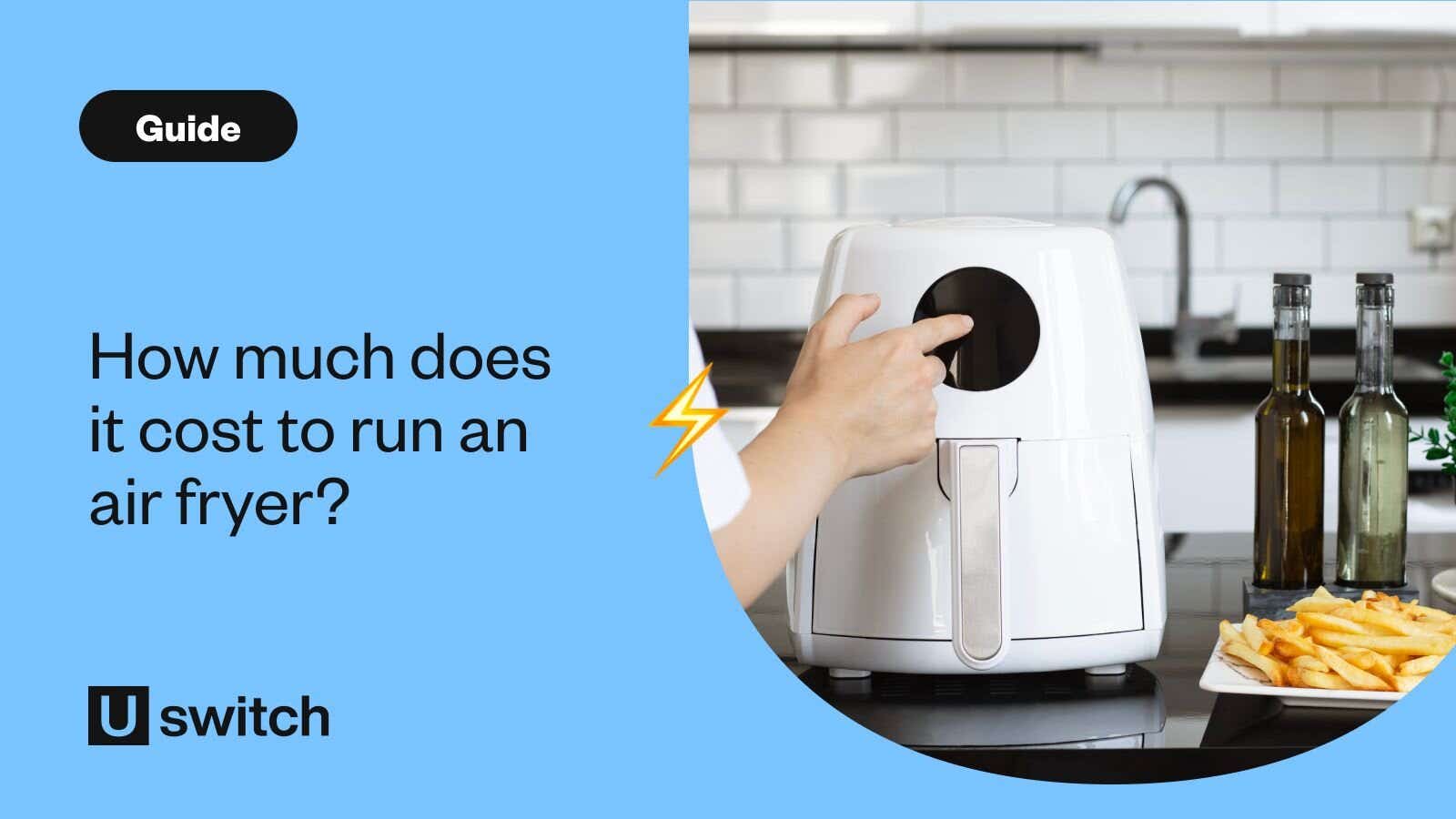How much does it cost to run an air fryer?


Are air fryers cheap to run?
it depends on the air fryer's size, which determines how much energy it uses and therefore how much it costs to run.
The following table shows how much air fryers cost to run per hour based on the January 2026 electricity price cap of 27.69p per kWh:
| Appliance | Consumption/hour | Cost/hour |
|---|---|---|
| Small air fryer (1 basket) | 0.8 kWh | 22p |
| 1.3 kWh | 36p | |
| 1.4 kWh | 39p | |
| 1.6 kWh | 44p | |
| Large air fryer (2 baskets) | 1.8 kWh | 50p |
| 2.0 kWh | 55p | |
| 2.5 kWh | 69p | |
| 2.8 kWh | 78p |
What affects the amount of energy an air fryer uses?
There are several factors that influence how much energy an air fryer uses:
- Size – the size of an air fryer’s basket or drawer (or the fact it has two). Choose the right model to meet your household’s needs
- Cooking temperatures – the higher the temperature, the more energy used
- Cooking time – although a 2,800 kWh-rated air fryer might consume 2-3 times the energy of a smaller model, it’ll also cook food in less time, so factor this in when comparing models
- Preheat efficiency – if your air fryer offers this setting, use it to reduce the time larger, heavier items need before they reach the optimum temperature for cooking
- How often you cook – if you cook every night with your air fryer, it’ll use more energy than if you only use it once or twice a week; however, if you’re using your air fryer instead of your main oven, you’ll save energy every time you use it (see below)
- The amount you cook – you use less energy when cooking smaller meals, so an air fryer is significantly more efficient than your oven when cooking for one or two people.
Air fryers vs. ovens
If a compact air fryer consumes a fraction of the energy used by an electric oven, should it always be the better choice?
Not necessarily. It depends on what you’re cooking, and how many people you’re cooking for. Compact air fryers are perfect for:
- Cooking quick meals for 1-2 people (or 3-4 people with larger models)
- Cooking meals quickly – you can cut cooking times when using the air fryer. For example, chicken breast can be cooked in as little as 15-20 minutes instead of 30+ minutes in the oven (always check food is thoroughly cooked before serving).
However, there are times when the oven may prove the better choice. They include:
- Cooking for a large group of people
- Cooking multiple dishes in a single meal
- Cooking bigger meals like roasts – these take longer, and a well-insulated oven can switch off for longer periods after reaching the desired temperature to maximise efficiency
- Batch-cooking meals for the next few days – cook them all at once in the oven instead of one at a time in the air fryer. They can then be reheated in your microwave, which is even more efficient than your air fryer.
Energy consumption of air fryers vs. electric and gas ovens
How do air fryers compare to electric and gas ovens? The following table is for basic comparison only – it doesn’t consider things like air fryers typically cooking food 20% quicker than ovens, or gas ovens reaching temperature quicker than electric ovens.
| Appliance | Energy rating | Cost/hour | Cost/year |
|---|---|---|---|
| Electric oven | 2-5 kWh | 55p-£1.38 | £110-£276 |
| Gas oven | 1.3-1.7 kWh | 8-10p | £16-£20 |
| Compact air fryer | 0.8-2 kWh | 22-55p | £44-£110 |
| Large air fryer | 1.8-2.8 kWh | 50-78p | £100-£156 |
*Cost based on January 2026 price cap (27.69p/kWh electricity, 5.93p/kWh gas). Annual cost is based on cooking for a cumulative 200 hours (around 33 minutes each day).
Is it cheaper to run an air fryer or use an oven?
In blunt terms, a gas oven is cheaper to run than an air fryer, but an air fryer is usually cheaper than using your electric oven for three main reasons:
- Less electricity usage – the air fryer requires less energy to heat your food
- Lower cooking temperatures – the way food is heated in an air fryer – using heat convection technology – means it can be cooked at a slightly lower temperature than in a conventional oven. Reduce temperatures by 10-20°C
- Faster cooking times – despite the lower temperature and energy demands, the smaller compartments and heating method mean that food is cooked quicker in an air fryer – reduce cooking times by 20% when following recipes.
To ensure you maximise your savings (and enjoy better-cooked food) in your air fryer, try the following tips:
- Only preheat when you need to – some air fryers take 10-15 minutes to reach the desired temperature, but preheating may be unnecessary for smaller items
- Cook entire meals – you can cook more than one dish in an air fryer, such as fish fingers and chips. But be aware that different items may require different temperatures
- Think about circulation – arrange your food so that the hot air can circulate efficiently through your food, cooking it more quickly
- Clean it regularly – make sure you regularly clean your air fryer basket or drawer, so it continues to cook efficiently.
Air fryers vs. other cooking appliances
While air fryers are cheaper to run than electric ovens, they’re not the cheapest way to cook your food. Here’s how air fryers compare to other electrical cooking appliances:
| Appliance | Consumption/hour | Cost/hour |
|---|---|---|
| Compact air fryer | 0.8-2 kWh | 22-55p |
| Large air fryer | 1.8-2.8 kWh | 50-78p |
| Microwave | 0.6-1.0 kWh | 17-28p |
| Slow cooker | 0.2-0.4 kWh | 6-11p |
| Pressure cooker | 0.7-1.2 kWh | 19-33p |
*Cost based on January 2026 price cap.
Remember: while these alternatives offer more energy-efficient ways to cook your food, they don’t produce the same crispy results as an air fryer. For example, a microwave is most effective at reheating food, while a slow cooker is best for cooking one-pot meals like stews.
Should I invest in an air fryer?
There are numerous reasons why you might want to invest in an air fryer: healthier, tastier food that cooks in less time and results in less mess. An air fryer takes up less space than an oven, and some models allow you to do more than simply air fry food: you can roast, grill, bake and more.
However, there’s an even more compelling reason to invest in an air fryer: significant savings on your energy bills. The amount you save and how long it takes you to recoup your costs will depend on the model you choose. However, from a purely economic point of view, an air fryer makes perfect sense for people who live alone or in households of two: a compact air fryer can be purchased for under £50, and by switching most if not all your meals to this from your oven you can even recoup that cost within six months to a year.